National Human Rights Commission

NHRC, India organises its core advisory group meeting on environment, climate change and human rights
Acting Chairperson, Smt Vijaya Bharathi Sayani stresses the need for corporate accountability in mitigating climate change impact
Secretary General, Shri Bharat Lal emphasises the urgency for strengthening monitoring systems and promoting coordinated action by all stakeholders to deal with climate change concerns
Among various suggestions, collecting data on climate change at the district level to understand its dimensions and collaborate with local communities to develop expertise with sustainable solutions to mitigate its impact underscored
Posted On: 17 DEC 2024 7:57PM by PIB Delhi
The National Human Rights Commission (NHRC), India organised a core advisory group meeting on environment, climate change and human rights on the theme ‘Climate Change and Human Rights’ in hybrid mode at its premises in New Delhi. Inaugurating it, NHRC, India Acting Chairperson, Smt Vijaya Bharathi Sayani emphasised that climate change is impacting vulnerable communities, particularly tribal people whose traditional livelihoods are directly tied to the environment. She highlighted the ancient wisdom embedded in Indian texts, which underscores the deep connection between humanity and nature, to find solutions to deal with the challenges posed by climate change.
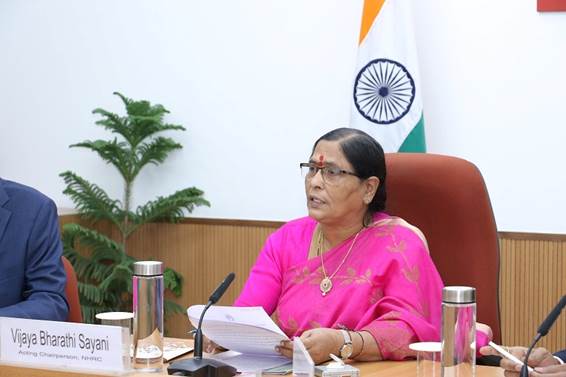
She called for urgent action in strengthening disaster preparedness and building resilient systems. Urging businesses to adopt sustainable practices respecting the environment and human rights, she stressed the need for corporate accountability in mitigating climate change impact.
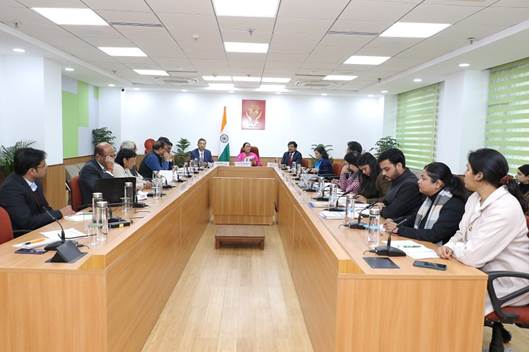
Before this, the NHRC, India Secretary General, Shri Bharat Lal, in his opening remarks, underscored the importance of addressing climate change and environmental concerns with a human rights perspective. He said that a clean, healthy, and functional environment including the right to clean air and water is essential for the enjoyment of basic human rights like the rights to life, health, food, and a decent standard of living.
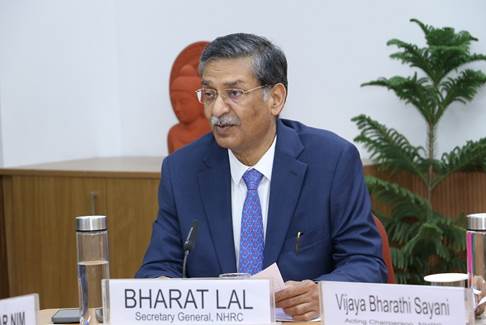
Shri Lal emphasised the urgency for strengthening monitoring systems and promoting coordinated action by all stakeholders to deal with climate change concerns. He urged the participants to share concrete advice, and actionable suggestions, to enable the NHRC to make necessary recommendations to the government.
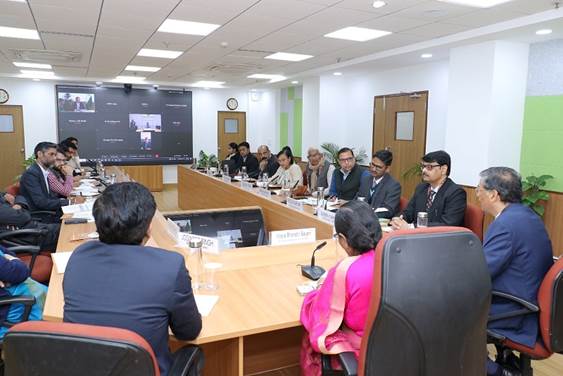
Shri Devendra Kumar Nim, Joint Secretary, NHRC, gave an overview of the meeting divided into three agendas for discussion. These were the impact of climate change on Indigenous populations, extreme weather events and their effects on lives and livelihoods, and Corporate accountability in the context of climate change. He highlighted the NHRC’s ongoing efforts to address human rights violations related to environmental degradation, including the resolution of over 8,900 cases. He also emphasised the Commission’s advisory issued to State Governments and UTs on mitigating the impacts of environmental pollution, which has led to significant actions such as the notification of special environmental courts in Karnataka.
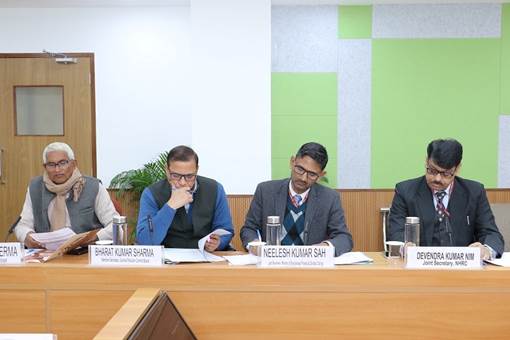
Some of the suggestions which emanated from the discussions were as follows:
1. Collecting data on climate change at the district level to understand its dimensions, and collaborate with local communities to develop expertise with sustainable solutions to mitigate its impact is necessary;
2. Promote research into the reasons and effects of climate change on migration from rural to urban areas in India;
3. Identify areas prone to climate change to create a climate risk atlas and mitigate potential impacts;
4. Ensure the effective implementation of “The Provisions of the Panchayats (Extension to the Scheduled Areas) Act, 1996” (PESA Act) and the Forest Rights Act (2006);
5. Re-align Corporate Social Responsibility subjects with environmental issues to re-focus from urban to rural areas;
6. Encourage plantation in arid regions using a 1-litre water technique for agroforestry in addition to crops
The Commission will further deliberate on the various suggestions to finalise its recommendations to the government on addressing various challenges aggravated by climate change.
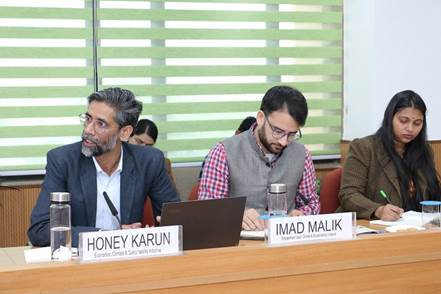
The speakers, among others, included Shri Neelesh Kumar Sah, Joint Secretary, Ministry of Environment Forest & Climate Change, Shri Bharat Kumar Sharma, Member Secretary, Central Pollution Control Board, Shri Amitabh Agnihotri, NHRC Special Monitor on Environment, Climate Change & Human Rights, Shri Sundaram Verma, Environmentalist; Smt. Patricia Mukhim, Social Activist and Editor, The Shillong Times, Dr. B. S. Adhikari, Scientist – G, Wildlife Institute of India (WII), Dr. Padma Rao, Chief Scientist, National Environmental Engineering Research Institute, Shri Ram Kumar Agrawal, Director, Commission on Air Quality Management, Col. Ravindra Yadav, Director, National Rainfed Area Authority, Shri Vinay Kumar (IFS), Deputy Director, Indian Council of Forestry Research & Education, Prof. N. H. Ravindranath, Retired Professor, IISc Bangalore, and Shri Niranjan Deo Bharadwaj, Dr. Promode Kant, Shri Honey Karun and Shri Imad Malik, Climate and Sustainability Initiative.
*****
NSK
(Release ID: 2085429) Visitor Counter : 189


































